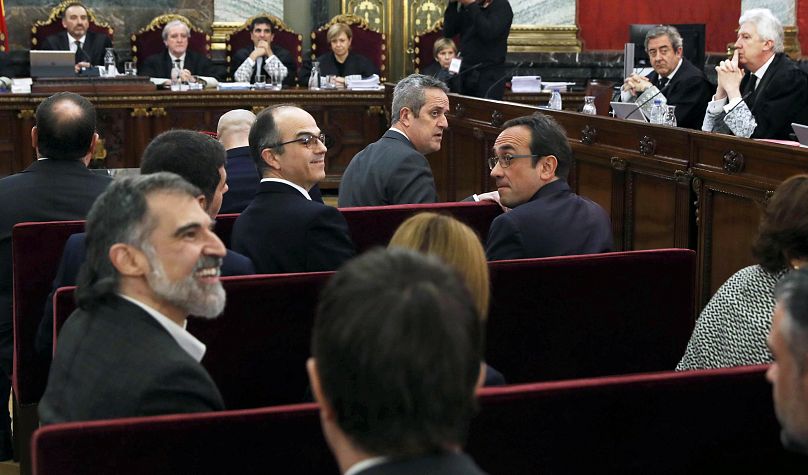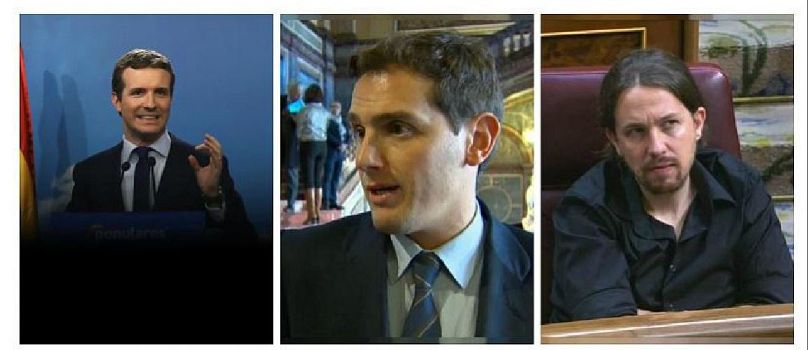The Catalan issue has pushed Spain into yet another election. Here's all you ned to know.
Spanish Prime Minister Pedro Sanchez called a snap election for April 28 after the Catalan parties brought down his minority socialist government by voting down the budget.
Here is everything you need to know about the snap vote.
Why did Sanchez call a snap vote?
"One cannot govern without a budget," Sanchez said when he called the election in February.
“Between doing nothing and continuing without the budget and calling on Spaniards to have their say, I choose the second. Spain needs to keep advancing, progressing with tolerance,” he said.
The fallout with Catalonia after independence bid ruled unconstitutional in 2017 is still proving a burden to Spanish politics. The day before the budget vote, 12 Catalan leaders went on trial in Spain's Supreme Court for their role in the secessionist drive.
Sanchez's Socialist party (PSOE) has also faced pressure from the centre-right parties (Popular Party and Ciudadanos) and far-right Vox party, who called on supporters to protest in Madrid in February over the government's handling of the Catalan crisis.
"The call for early elections after less than a year of the Sanchez government demonstrates once again what we already knew: the Catalan question is the main source of instability for Spanish politics," Spanish sociologist and political scientist Jorge Galindo told Euronews.
The vote will be the country's fourth general election in eight years.
Sanchez has governed with no electoral mandate and with only 84 deputies in the 350 seats in Congress. He decided not to call an early election after ousting conservative Prime Minister Mariano Rajoy in June.
An unusual debate pattern
For the first time in history, two electoral debates were held consecutively.
Two main blocks surged during the debate: one on the right with the PP and Ciudadanos and one of the left with PSOE and Podemos. The candidates tried not to name the far-right Party which had its invitation for the debate withdrawn but it was the elephant in the room throughout the evening and according to polls it will still get enough seats in Congress to form a pact with the right-wing bloc.
Catalonia
The unity of Spain was an arching theme during the debate, especially during the interventions of the PP and Ciudadanos leaders who accused Sanchez of putting the unity of the country at risk in order to stay in power. Pablo Iglesias from Podemos warned that it was hard to recover coexistence between Spaniards in an aggressive way.
Pablo Casado from the PP argued that the dicey situation Spain now finds itself in is because of the Sanchez government and its pact with the separatists.
While Albert Rivera from Ciudadanos called out Sanchez for making agreements with the president of the Catalan regional government, Joaquim Torra.
Journalist Jaime Velazquez told Good Morning Europe that Sánchez had successfully defended his position as favourite, but that he might come under more fire in the second debate.
What do the polls predict?
The latest polls for the elections published on Monday still predict a victory for the PSOE but is unclear on the extent of this victory.
Polls released by Spanish media between Sunday and Monday also predict a PSOE victory with between 28 and 31.5% of the votes and 155 to 139 MPs out of 350 total members in Congress.
How much of a threat is Spain's far-right?
Since the death of Francisco Franco in 1975 and the subsequent return to democracy, no far-right party has governed in the country. That was until Vox formed a coalition with PP to govern the southern region of Andalucia.
Another tie-up could see the PP and Ciudadanos joining a coalition with the far-right party. However, it is unclear if the centre-right Ciudadanos party would agree to a tie-up with a far-right party.
Who are Sanchez's rivals?
Pablo Casado (Popular Party): Rajoy's successor has hit out at Sanchez's strategy to try and solve the Catalan crisis with dialogue.
He has given the PP a harder right-wing line since Rajoy was ousted and has demanded the return of abortion laws that were similar to those of the 1980s.
Casado has also said that if he is elected as prime minister, he would consider reissuing article 155, which would see the central government take back direct control of Catalonia.
After the election was announced Casado said: "The first thing we have to say is that we are happy. For almost nine months we have been calling on Pedro Sanchez to fulfil his promise and give the Spanish people a voice and call elections."
"Why has he had to do so today? Because the PP has managed to push the Sanchez government to throw in the towel."
Albert Rivera (Cuidadanos): The leader of the centre-right Ciudadanos party has previously described Sanchez's government as "Government Frankenstein".
Rivera like Casado berated the socialist government for playing too soft a hand with Catalonia.
Rivera, 39, has already started his electoral campaign in saying: "Spain needs liberalism, patriotism, future and modernity... Speaking of Franco and of abortion is not constructive."
Pablo Iglesias (Podemos): The 40-year-old leftist leader took time out for paternity leave but has now returned.
The party is going through its umpteenth internal crisis following the resignation of Iñigo Errejón, one of the most relevant figures since the party was founded in 2014.
Santiago Abascal (Vox): The far-right could break into Spain's parliament for the first time since Spain became a democracy. Party leader Santiago Abascal, 42, has a long political career behind him and was a former member of the Basque parliament.













